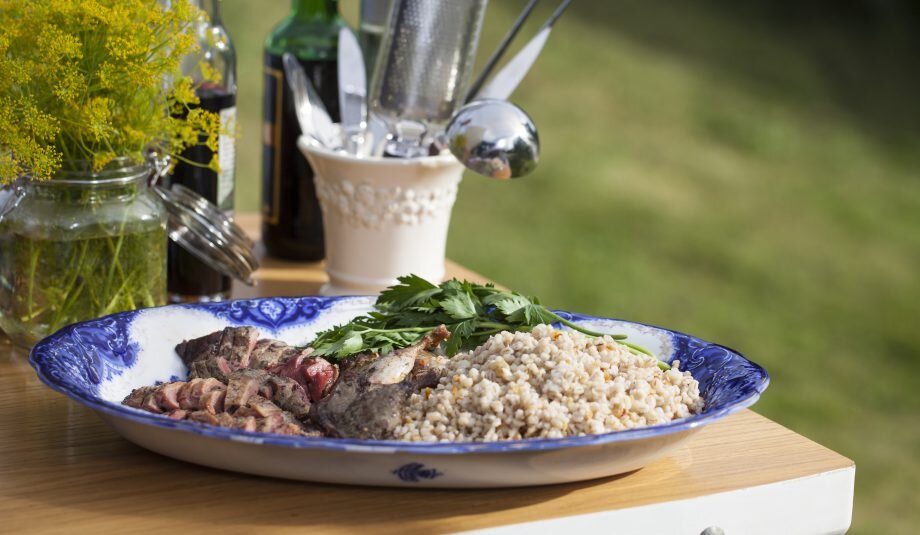Pressed Wild Duck with Madeira
Making pressed wild duck is a very demanding task. It can be done as explained below, or if you do not have a duck press you could use a food mixer as described under "Preparation". The dish is made as follows: roast a whole duck until it is crispy and golden on the outside and pink - fairly bloody - on the inside. You then present the whole duck to your guests, who are supposed to nod in recognition when they see it. The next stage is to cut off the thighs and return them to the oven for further roasting. The breast is then cut off and sliced and it should still be more red than pink on the inside. Next comes the hard part: place the bones and everything else that is left, i.e. not the breast or thighs, in a duck press, which is a large device which resembles an old, silver-plated instrument of torture. After a lot of effort on the part of whoever is operating the duck press, you will obtain a few drops of juice - a mixture of duck fat and blood, which can be used instead of butter for thickening the sauce. The dish is then served twice: first the breast with the blood sauce, followed by the crispy, roasted duck thighs.
INGREDIENTS:
List of ingredients
2 wild ducks, just over 2 lb. (1 kg) each, or 1 tame duck weighing approx. 5 lbs (2.2 kg)
2 tsp. caraway
2 tsp. dill seeds
4 crushed allspice corns
4 crushed juniper berries
4 crushed cloves
1 tsp. crushed coriander seeds
2 cups (5 dl) cooked barley
6 tbs. onions, finely chopped
4 tbs. celeriac, finely chopped
1 red cabbage, finely chopped
1 savoy cabbage, finely chopped
1½ cups (4 dl) Madeira
1½ cups (4 dl) reduced duck stock (see recipe)
Butter
Sugar
Vinegar
Salt
Pepper
Number of servings
Servings: 4
PREPARATION:
Cut away the large neck flap, which is often left hanging down on the duck. Remove the heart, liver and giblets, which are often left in a small bag inside the duck’s stomach. Crush the allspice, juniper berries, coriander seeds and cloves in a mortar. Rub the ducks with the spice mixture, salt and pepper and allow them to stand while the oven heats up. For extra crispy skin, you should prick the fat on the breast with a fork.
Preheat the oven to 390 Fahrenheit (200 Celsius). Rub the ducks with butter and place them on a shelf in the oven. Roast for 25-35 minutes until the core temperature of the breasts reaches around 120 Fahrenheit (50 Celsius), i.e. fairly bloody. Larger ducks will require longer. Place a fireproof dish underneath the shelf to catch the duck juice.
In the meantime you can fry the onions and celeriac and heat them up with the boiled barley. Add parsley, salt and pepper to taste. Fry the red cabbage in a frying pan over a medium heat in the rapeseed oil, vinegar, caraway, sugar, salt and pepper. Fry the savoy cabbage in a frying pan over a medium heat in the rapeseed oil, vinegar, dill seeds, sugar, salt and pepper.
Take the ducks out of the oven. Cut off the thighs and put them back in the oven. Cut off the breasts and lay them on a very hot plate.
Now here comes the challenge. Divide the rest of the ducks into small pieces and crush them in a food mixer. This will produce a small amount of liquid, i.e. a mixture of blood and fat. If you want to obtain more, place the bones in a kitchen towel, place it in a colander and press down using something heavy, e.g. a saucepan. This should provide some extra liquid.
Bring the duck juice and the Madeira to the boil. Remove the sauce from the heat and wait for a couple of minutes. Whisk in the fat and the remaining blood. This should be done vigorously. The aim is for the sauce to be thickened by the blood, but it is important that it does not separate. To obtain a wilder, more authentic taste (despite the preparation being different), add the duck liver and blend it until you obtain a thick, smooth sauce. Taste the sauce. You may need to heat it up a bit more if you have used the liver.
Cut the breasts into thin slices, pour over the sauce and serve.
The thighs will benefit from being roasted for a further 15 to 20 minutes. They should be served piping hot, straight from the oven.

